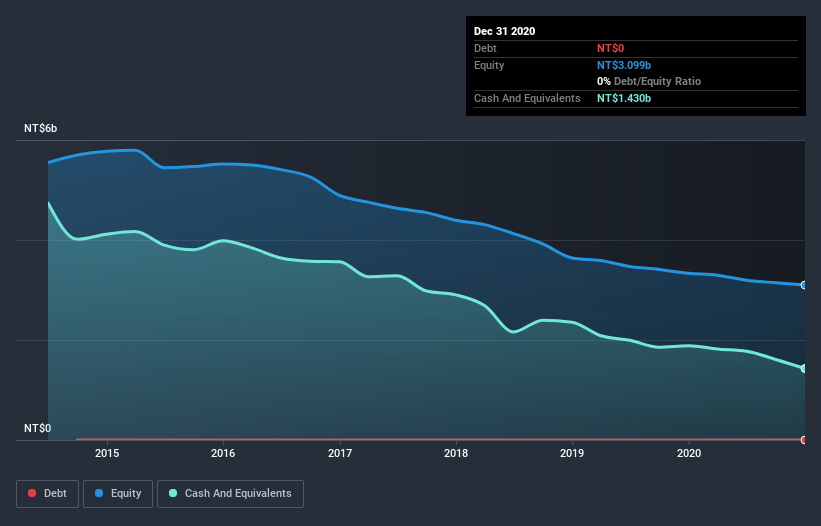
Just because a business does not make any money, does not mean that the stock will go down. For example, ALi (TPE:3041) shareholders have done very well over the last year, with the share price soaring by 112%. But the harsh reality is that very many loss making companies burn through all their cash and go bankrupt.
So notwithstanding the buoyant share price, we think it's well worth asking whether ALi's cash burn is too risky. In this article, we define cash burn as its annual (negative) free cash flow, which is the amount of money a company spends each year to fund its growth. First, we'll determine its cash runway by comparing its cash burn with its cash reserves.
Check out our latest analysis for ALi
Does ALi Have A Long Cash Runway?
A company's cash runway is calculated by dividing its cash hoard by its cash burn. As at December 2020, ALi had cash of NT$1.4b and no debt. In the last year, its cash burn was NT$407m. Therefore, from December 2020 it had 3.5 years of cash runway. A runway of this length affords the company the time and space it needs to develop the business. Depicted below, you can see how its cash holdings have changed over time.

How Well Is ALi Growing?
On balance, we think it's mildly positive that ALi trimmed its cash burn by 10% over the last twelve months. And operating revenue was up by 3.0% too. In light of the data above, we're fairly sanguine about the business growth trajectory. In reality, this article only makes a short study of the company's growth data. You can take a look at how ALi has developed its business over time by checking this visualization of its revenue and earnings history.
Can ALi Raise More Cash Easily?
There's no doubt ALi seems to be in a fairly good position, when it comes to managing its cash burn, but even if it's only hypothetical, it's always worth asking how easily it could raise more money to fund growth. Issuing new shares, or taking on debt, are the most common ways for a listed company to raise more money for its business. One of the main advantages held by publicly listed companies is that they can sell shares to investors to raise cash and fund growth. By comparing a company's annual cash burn to its total market capitalisation, we can estimate roughly how many shares it would have to issue in order to run the company for another year (at the same burn rate).
ALi has a market capitalisation of NT$5.7b and burnt through NT$407m last year, which is 7.1% of the company's market value. Given that is a rather small percentage, it would probably be really easy for the company to fund another year's growth by issuing some new shares to investors, or even by taking out a loan.
Is ALi's Cash Burn A Worry?
As you can probably tell by now, we're not too worried about ALi's cash burn. For example, we think its cash runway suggests that the company is on a good path. Its weak point is its revenue growth, but even that wasn't too bad! Considering all the factors discussed in this article, we're not overly concerned about the company's cash burn, although we do think shareholders should keep an eye on how it develops. An in-depth examination of risks revealed 1 warning sign for ALi that readers should think about before committing capital to this stock.
If you would prefer to check out another company with better fundamentals, then do not miss this free list of interesting companies, that have HIGH return on equity and low debt or this list of stocks which are all forecast to grow.
If you decide to trade ALi, use the lowest-cost* platform that is rated #1 Overall by Barron’s, Interactive Brokers. Trade stocks, options, futures, forex, bonds and funds on 135 markets, all from a single integrated account. Promoted
New: Manage All Your Stock Portfolios in One Place
We've created the ultimate portfolio companion for stock investors, and it's free.
• Connect an unlimited number of Portfolios and see your total in one currency
• Be alerted to new Warning Signs or Risks via email or mobile
• Track the Fair Value of your stocks
This article by Simply Wall St is general in nature. It does not constitute a recommendation to buy or sell any stock, and does not take account of your objectives, or your financial situation. We aim to bring you long-term focused analysis driven by fundamental data. Note that our analysis may not factor in the latest price-sensitive company announcements or qualitative material. Simply Wall St has no position in any stocks mentioned.
*Interactive Brokers Rated Lowest Cost Broker by StockBrokers.com Annual Online Review 2020
Have feedback on this article? Concerned about the content? Get in touch with us directly. Alternatively, email editorial-team (at) simplywallst.com.
About TWSE:3041
ALi
Engages in the research, development, design, and sale of chipsets for consumer electronic products in Hong Kong, Mainland China, Korea, Taiwan, Singapore, and internationally.
Excellent balance sheet and slightly overvalued.
Similar Companies
Market Insights
Community Narratives



